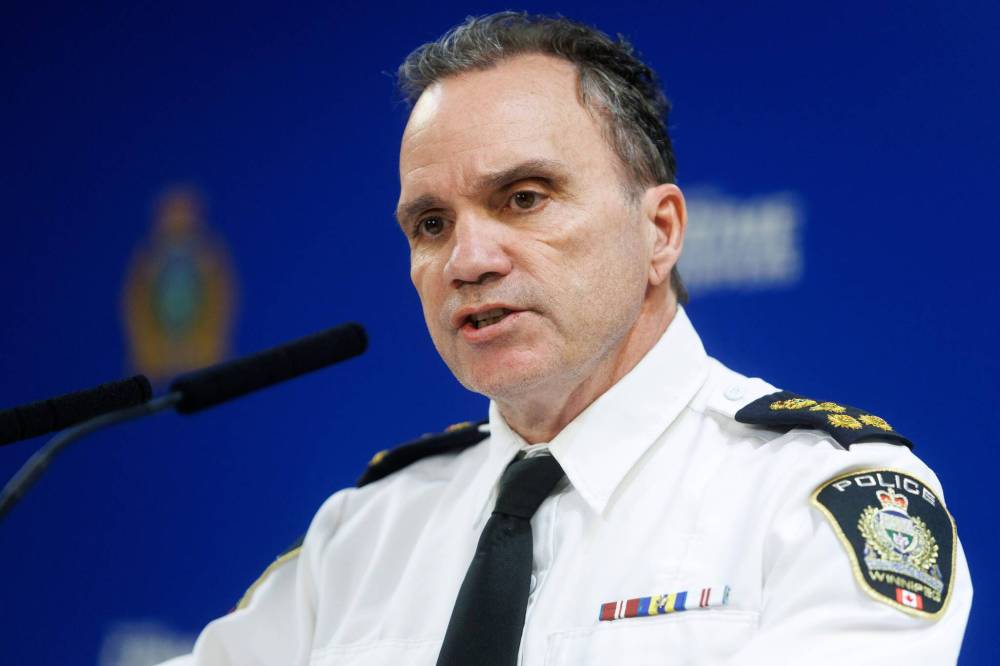Defusing crises, saving lives have to be police chief’s priorities
Advertisement
Read this article for free:
or
Already have an account? Log in here »
To continue reading, please subscribe:
Monthly Digital Subscription
$19 $0 for the first 4 weeks*
- Enjoy unlimited reading on winnipegfreepress.com
- Read the E-Edition, our digital replica newspaper
- Access News Break, our award-winning app
- Play interactive puzzles
*No charge for 4 weeks then billed as $19 every four weeks (new subscribers and qualified returning subscribers only). Cancel anytime.
Read unlimited articles for free today:
or
Already have an account? Log in here »
Welcome to the alternative reality of Winnipeg Police Service Chief Danny Smyth.
This week, Smyth was asked to respond to calls from the Police Accountability Coalition — an umbrella group of social service agencies and advocates — to create civilian-led teams to respond to mental-health and addictions crises.
At first blush, you might think that Smyth and PAC would be on the same page. Smyth has frequently complained — and with good reason — that police spend too much time responding on wellness checks and other calls involving mental-health and addictions issues.

MIKE DEAL / FREE PRESS FILES
Winnipeg Police Service Chief Danny Smyth
But rather than finding common ground, Smyth is clinging desperately to the idea that police must lead crisis interventions. He also suggested there was already an acceptable level of civilian involvement, and only mental-health clinicians are better trained in crisis intervention than police officers.
“This notion that (civilian involvement) doesn’t occur in our community is misleading by the way it’s being reported, because there are lots of groups that are attempting to deal with people before they get into crisis,” he told reporters. “It’s not something that we’re lacking. Could we use more of it? Probably.”
Why would Smyth not join the call for more investment in civilian-led responses? And why would Smyth suggest that Winnipeg is “not lacking” in non-police interventions?
Smyth seems unaware the “groups” he referenced are the ones who want less police involvement in crisis intervention.
Underlying the debate between Smyth and PAC is the structure of the Alternative Response to Citizens in Crisis program, which was launched as a pilot in 2021. ARCC teams include a police officer in plain clothes and a mental-health clinician to do wellness checks, perform assessments and de-escalate non-criminal crisis situations.
In 2022, ARCC was involved in 882 police calls involving 530 different people. By some measures, the program was a success: ARCC resulted in fewer involuntary admissions for treatment, fewer transports to hospitals and fewer dispatched calls for service. In total, its teams were able to resolve crises without involvement by other police resources, and 91 per cent of clients were able to remain in the community.
Largely based on those results, the province agreed to expand funding to ARCC to allow it to operate seven days a week, although the program is still not available 24 hours a day.
The Police Accountability Coalition, however, believes police — who determine when ARCC teams can be deployed — are still putting too many limitations on their use; the teams are not dispatched to emergent or criminal incidents.
The advocates cite two high-profile incidents where ARCC was not involved, and where tragedy was the result.
On New Year’s Eve, Afolabi Stephen Opaso, a 19-year-old international student suffering from an acute mental-health crisis, was shot and killed by police. ARCC was not staffed at the time of the incident.
And in February, a 59-year-old man living in a home on Magnus Avenue was shot and killed after resisting police attempts to take him for an involuntary mental-health examination. Police pre-determined that ARCC involvement was not appropriate in the case.
PAC has consistently pointed to a program in Canada’s biggest city as a better option.
Toronto’s Community Crisis Service also involves a team approach, but unlike Winnipeg’s ARCC, there are no plainclothes police involved.
During a one-year pilot project from March 2022 to March 2023, the CCS responded to nearly 7,000 calls made to 911, 4,800 of which were resolved without police involvement.
The CCS teams were able to perform 3,000 post-crisis followups and connected 1,160 people to case-management support services. Last fall, Toronto city council voted to expand the program to all areas of the city seven days a week.
The problem with the Toronto comparison is that both programs face the same limitations. Police decide when they are deployed, and they’re not involved in emergent calls.
This means the real issue here is not how to limit the use of police, but rather how to expand the use of mental-health professionals.
The two most recent police shootings in Winnipeg certainly raise questions about why ARCC could not have been used in some capacity to prevent their tragic conclusions.
Police have suggested that because Opaso was agitated and armed with a knife, the situation was beyond ARCC’s scope, but have not explained why a mental-health clinician could not have been part of a de-escalation effort.
Similar concerns surround the Magnus Avenue shooting, where the victim discharged a fire extinguisher at police.
If that individual required apprehension for an involuntary examination, it seems to make sense that mental-health clinicians should have been involved in the initial contact.
It’s entirely possible that early efforts of clinicians may not have been successful in defusing either situation. But it’s also reasonable to wonder what might have been, had a different perspective been introduced in both crises.
It’s time to for Smyth and others at the WPS to wake up and smell the future of crisis intervention.
Police will always be involved in the most serious cases. But that does not mean they have to lead the response.
dan.lett@winnipegfreepress.com

Dan Lett
Columnist
Born and raised in and around Toronto, Dan Lett came to Winnipeg in 1986, less than a year out of journalism school with a lifelong dream to be a newspaper reporter.







